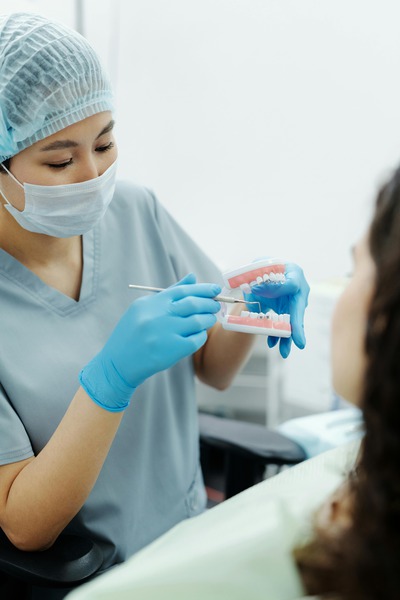We all want to flash a stunning smile and enjoy fresh breath, but have you ever considered how your diet affects your oral health? Maintaining strong teeth and healthy gums isn’t just about brushing and flossing—it also involves eating the right foods. Just as certain foods can harm teeth and gums, others play a crucial role in preventing tooth decay, gum disease, and bad breath.
Discover the Best Foods for Your Teeth
Let’s chew over the diet essentials for a healthy mouth. Here’s what to load onto your plate:
-
Dairy products: Cheese, milk, and yogurt are rich in calcium and phosphorus, which can protect tooth enamel and even help replace minerals in teeth (a process called remineralization).
-
Crunchy fruits and vegetables: Apples, carrots, and celery not only provide vitamins and minerals but also help clean teeth and freshen breath as you chew.
-
Leafy greens are high in calcium, folic acid, and various important vitamins and minerals, and they also help to maintain tooth enamel.
-
Almonds and other nuts: Full of calcium and protein while low in sugar, they are great for strengthening teeth.
Foods and Drinks to Limit for Optimal Oral Health
Some items you’re better off consuming in moderation include:
-
Sugary snacks and beverages: These are a primary culprit for tooth decay as sugar fuels the bacteria that cause cavities.
-
Acidic foods: Citrus fruits and tomatoes can erode tooth enamel over time if consumed in excess.
-
Sticky and hard candies: They can linger on your teeth’s surface, increasing the risk of cavities and potentially damaging dental work.
Stay Hydrated for Mouth Health
Water isn’t just vital for your overall health—it’s also a key player in maintaining oral health.
-
Promotes saliva production: Saliva is necessary for washing away food particles and neutralizing harmful acids.
-
Helps prevent dry mouth: A dry environment in your mouth can increase the risk of tooth decay and gum disease.
-
Contains fluoride: If your water is fluoridated, it can help prevent tooth decay.
How Nutrients Function for Oral Health
Similar to how they support body health, certain nutrients directly contribute to oral health:
-
Calcium: Vital for strong teeth and bones.
-
Phosphorus: Works with calcium to protect and rebuild tooth enamel.
-
Vitamin D: Helps the body utilize calcium.
-
Vitamin C: Essential for gum health and the prevention of gingivitis.
Why Visiting the Dentist Matters
In addition to a balanced diet, visiting the dentist regularly is necessary for maintaining oral health. A routine dental check-up allows professionals to provide an oral health check, professional teeth cleaning, and other preventive dentistry services. They can also offer dental hygiene tips unique to your needs.
Establishments offering bright smile dentistry services typically offer teeth whitening services and can guide you on how to maintain your beaming smile post-treatment. Incorporating professional advice into your dental care routine boosts the effectiveness of your home dental care practices.
Utilizing Advanced Dental Care Services
In the realm of dental care, technology continuously evolves. Staying on top of your oral health often involves advanced dental services, like Itero digital impressions, dental surgery services, and digital tools for precise diagnostics.
For instance, services that include stereo digital impressions can ensure a high level of accuracy for dental treatments, contributing to the longevity and success of procedures such as restorative dentistry and orthodontic treatments, in addition to enhancing the patient experience.
Regular Dental Care is Crucial
Dental care isn’t just reactive; it’s preventive. Regular dental visits for services like a dental exam and cleaning can help prevent gum disease and tooth decay, among others. Emergency dental services and family dentistry are also cornerstones of good oral care, ensuring every family member, from children to adults, receives requisite attention for their unique dental healthcare needs.
For example, cutting-edge treatments such as Corpus Christi composite fillings not only restore the function of the tooth but are aesthetically pleasing due to their natural tooth color, blending seamlessly with your teeth. These types of dental care routine procedures actively maintain the health of your teeth and can potentially avoid the need for emergency dental service.
Role of Dental Insurance in Oral Health
Understanding and investing in dental insurance can have a big impact on your oral care practices. Many people avoid or delay necessary treatments due to costs, but affordable dental services are often available through various dental insurance plans.
-
Covers routine costs: Dental insurance typically includes preventive services like check-ups and cleanings.
-
Payments for extensive treatment: For more significant procedures, insurance can alleviate the financial burden.
-
Family plans available: Families can benefit from plans covering pediatric dentistry to general dental care for adults.
Dental Hygiene Tips for At-Home Care
Beyond diet and professional assistance, excellent dental hygiene starts at home.
-
Brush properly: Use fluoride toothpaste and brush for two minutes twice a day.
-
Floss daily: This removes food particles and plaque from between teeth and under the gumline.
-
Use mouthwash: Antiseptic mouthwash can help kill bacteria that cause gum disease and tooth decay.
Final Thoughts
Ultimately, a balanced diet, combined with a robust dental care routine, regular dental visits like those promoting Bright Smile dentistry, and utilizing advanced services such as itero digital impressions and Corpus Christi composite fillings, form the best foundation for good oral health.
This approach can also have positive effects beyond your mouth, contributing to your overall well-being. So, remember to nourish your smile from the inside out and keep up with your dental healthcare for a radiant smile that lasts a lifetime.




